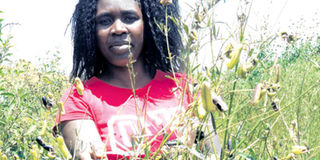How we clinched deal to supply veges to supermarket

Jane Omondi, Tatro Women Group marketing officer in their farm in Siaya. PHOTO | EVERLINE OKEWO | NATION MEDIA GROUP
What you need to know:
- The 10 acres have been leased by 18 farmers who belong to the umbrella Tatro group. They have been contracted by Uchumi Supermarket to supply vegetables.
- The farmers are normally paid every month, earning between Sh30,000 and Sh40,000, money that they divide amongst themselves depending on how they supplied.
- Paul Okong’o, a soil scientist and team leader of the group, notes with a supermarket, one is assured of the market and the selling price is known.
Their 10-acre farm in Mutumbu village in Siaya County is full of green plants that make it the envy of the hamlet.
Tatro Women Group grows a variety of vegetables that include spider plant (sagaa), black night shade (managu), Ethiopian kale (kadhira), jute mallow (mrenda), cowpeas (kunde), amaranthus (terere) and sukuma wiki (collard green).
The group brings together over 2,400 farmers who farm in groups scattered across the county.
The 10 acres have been leased by 18 farmers who belong to the umbrella Tatro group. They have been contracted by Uchumi Supermarket to supply vegetables.
“We are required to supply the produce by 9am every day. We have to be up by about 3am, pluck the vegetables from the farm, wash and tie them in bunches,” says Jane Omondi, who belongs to the 18-member group.
Timeliness is among the things a farmer has to strictly observe when trading with corporates like supermarkets.
“Supermarkets are strict to the extent that any breakage on the vegetable leaves or lateness in delivery leads to automatic disqualification,” observes Omondi.
Every day, the farmers supply 100 bunches of African night shade, 50 bunches of spider plant, 50 bunches of crotalaria, 20 bunches of sukuma wiki, 15 bunches of spinach, 15 bunches of cowpeas leaves and 20 bunches of Ethiopian kale.
A bunch is equivalent to 500g and goes for Sh25.
“As a smaller group, we were unable to meet the daily demand. We, therefore, source the vegetables from the other groups and this is what has enabled us maintain the contract,” says Omondi, a marketing officer of the entire group.
After harvesting, the produce is put in 30 to 50kg crates, ferried to a collection centre where it is cleaned, packaged neatly and transported to the supermarket in Kisumu.
“It is a business we have been doing for the past one year. The market is good but you need to be consistent and get it right always,” says Sarah Oduor, a member of the group.
The farmers are normally paid every month, earning between Sh30,000 and Sh40,000, money that they divide amongst themselves depending on how they supplied.
There are several conditions that one must meet before she is allowed to supply the produce.
“The supermarket looks at the quality and quantity of the vegetables one has. In terms of quality, they should be free of pests, diseases and pesticide residue,” says Omondi, adding that in terms of quantity, one must be able to supply certain bunches every day.
Besides being able to meet the demand, a group needs trading licence, Kenya Revenue Authority tax certificate, certificates of incorporation, among other documents to enable them trade with the supermarket.
Paul Okong’o, a soil scientist and team leader of the group, notes with a supermarket, one is assured of the market and the selling price is known.
“It is not like selling to brokers who keep on shifting prices.”
The group further specialises in the production of indigenous vegetable seeds after it was registered and licensed by the Kenya Plant Health Services (Kephis) to produce, package and brand the produce.
“We sell certified seeds at Sh180 for 50g and Sh280 for 100g,” he says, noting Kephis checks ensure their seeds are disease-free.
Peter Olewe, a senior technologist in the Department of Botany at Maseno University, says the demand for indigenous vegetables has grown significantly.
“Traditional vegetables are highly nutritious and are on high demand, and this has given us the opportunity to research on them in conjunction with various groups in the region,” Olewe says.





